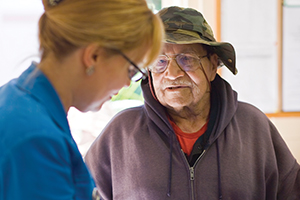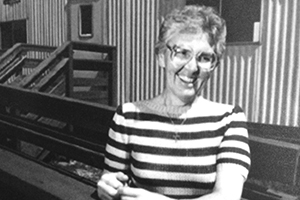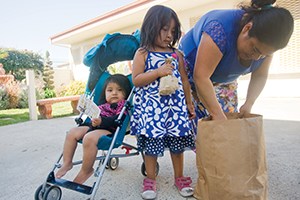By RENEE STOVSKY
Julie Ayala says her life's hardships have taught her an important lesson — to choose faith over fear.
"I've learned that today may be hard, but tomorrow will be better, because God takes care of everything," says Ayala, of Oxnard, Calif. "If you reach out, with God's blessing, someone will be there to lend a helping hand."

Health Ministries Director Lydia Kreil assists food pantry client Romero Madrigal at a food pantry in the La Colonia neighborhood of Oxnard, Calif. Health Ministries, a community outreach program of Dignity Health St. John's Regional Medical Center, operates the pantry. It distributed more than 87 tons of food last year.
In Ayala's case, that someone is Lydia Kreil. She directs the Health Ministries community outreach program at Dignity Health St. John's Regional Medical Center in Oxnard.
When Ayala, 43, and her husband, Armando Romero, 42, lost their financial stability and apartment due to the fallout from a serious illness, Kreil was able to offer emergency financial support and emotional assistance to their family, which includes five children, ages 1 to 15.
The family's troubles began when Romero, who is employed by Haas Automation, a large machine tool building company, landed in the hospital more than a year ago due to an infection caused by diabetes. His condition required long-term medical attention including nursing care, and it rendered him unable to work for a time. He had never purchased health insurance from Haas because he felt he couldn't afford the out-of-pocket cost.
"We applied for disability and MediCal insurance, but before we began receiving any help, we had used up all our savings. There came a time when I couldn't afford food and clothing for the kids. That's when someone told me about St. John's Health Ministries and I called Lydia," says Ayala. Kreil recalls being on the phone with Ayala for two hours on a Friday night.
A lifeline
The day Ayala had her initial intake appointment with Health Ministries, Kreil was able to direct her to both a food pantry and clothing donation center that Health Ministries supports in La Colonia, a Spanish-speaking neighborhood a few miles from the medical center.
The family no longer could afford their rent and essentially became homeless, alternating between a motel and the homes of families and friends. "Ventura County services had tried to help us find a house. By then we had disability assistance, but no one would rent to us because neither my husband nor I had a stable job," says Ayala, a stay-at-home mom. Kreil adds that rents are high in Oxnard; a typical two-bedroom unit can cost $1,700 to $1,800, and code requirements mandate the minimum size unit that a family can occupy legally based on the number of family members.
Kreil was able to extend a $300, no-interest loan so the family could put their belongings in storage. Then she helped Ayala with a budget plan and assisted in accessing county aid programs that could free up more money for the family's housing budget.
It's an ongoing struggle. "My husband has started to work again, but I can't find a job that will pay enough for me to cover child care," says Ayala, a former preschool teacher.
Despite the havoc her family is still experiencing, Ayala says she feels lucky.
"My children have been able to stay in the same school, and somehow when we need to pay a bill, help shows up in the nick of time," she says. "But my relationship with Lydia is my biggest blessing. She gives me advice and a shoulder to cry on. She has so much compassion for what we are experiencing."
Birth of a ministry
Compassion is an essential part of St. John's Health Ministries program, which traces its roots to 1986, when Sr. Carmen Rodriguez, RSM, saw a need to serve the poor and marginalized by taking sandwiches and used clothing in the trunk of her car to La Colonia, a largely Hispanic part of Oxnard populated with many undocumented, and often seasonal, workers.
Soon Sr. Rodriguez' ministry turned into St. John's ministry; the hospital gave Sr. Rodriguez a trailer on its parking lot for administrative offices. A few days a week, she met with clients in a meeting room at Our Lady of Guadalupe church in La Colonia. There Sr. Rodriguez would distribute food and clothing twice a week to about 55 families, and help enroll parishioners in MediCal and CalFresh, the state's Medicaid and food stamps programs.

In this 1985 photo, Sr. Carmen Rodriguez, RSM, stands outside a trailer on St. John's Regional Medical Center's parking lot that was her office as she built Health Ministries, an outreach ministry to a poor Latino neighborhood.
By 1994, with the help of the Archdiocese of Los Angeles and other community partners — from grocery stores, restaurants, retailers and even Boy Scout volunteers — an official food pantry and free used clothing program were established at nearby Christ the King Church.
Practical approach
"Sr. Carmen is a nurse, and her primary motivation for her ministry was to make sure that the hospital's discharged patients could maintain and improve their health," says Kreil. "Because she is also Hispanic, she understood the struggles many in this community face, just trying to feed the children and pay the rent. If there is not enough money left for the utility bill, for example, then it becomes impossible for a diabetic to refrigerate insulin."
Josefina Laurean, now one of two employees at the food pantry, besides Kreil, worked as a volunteer for 14 years with Sr. Rodriguez. She remembers her complete dedication to the people she served.
"Sr. Carmen was a perfectionist, very firm and strict. She knew the value of hard work, and encouraged people to improve their situation," Laurean recalls. "I remember in particular Sr. Carmen finding one boy a job doing yard work at a doctor's house. When he turned 16, she got him a job at the hospital. Now he is 28, married with kids, has his own home, and is still working for St. John's."
Zeroing in on Latino health
Though Sr. Carmen, now 80, moved on to other ministries in 2001, the food pantry and clothing ministry she founded has continued to thrive. In 2015, it served 8,228 clients, distributing 87 tons of food, serving more than 16,000 hot meals, providing clothing donations to more than 1,800 people, and giving more than $30,000 to low-income clients to cover prescriptions, emergency lodging, bus passes and to help with rent and utility bills.
Its current operating budget — just over $200,000 last year — ensures that the pantry is open twice a week, on Tuesday mornings and Thursday mornings and afternoons. In addition, hot meals are prepared and distributed on Tuesday afternoons. The clothes closet service is open on Wednesday mornings.
And St. John's Health Ministries program continues to look for new ways to meet this community's challenges. In addition to its annual community health needs assessment, in 2014 it conducted a population-specific Latino community health needs survey — and is now in the process of updating it again.
Food or medicine
"In addition to the regular questions that cover access to screenings such as mammograms and colonoscopies and number of emergency room visits, we conducted bilingual interviews to obtain demographic data like age and education, because often less schooling leads to higher incidences of uncontrolled diabetes and even obesity," says Kreil. The Latino health needs survey "confirmed that this marginalized population is constantly faced with the decision to feed a family or seek health care of any kind — be it physician visits, medications or preventative screenings."
To that end, the program is trying to work collaboratively with the church and other community organizations to actually address those needs through advocacy, organization and money that goes beyond the walls of the hospital and deeply into its Catholic mission and social tradition.

Marta Catarino, right, and daughters, Griselda, 1, and Jessica, 3, get ready to leave the food pantry with the family's bag of groceries.
One way of tackling those problems, says Kreil, is through time spent with people on an individual basis. "We try to educate clients not only in health literacy but also to teach them how to budget and make informed decisions in a socioeconomic setting that they find foreign," she says.
Protein boost
Another initiative the health ministry is undertaking is to improve the quality of food that is distributed at the pantry. A new $20,000 grant is aimed at improving the amount of protein that is provided; the hospital's dietitians are collectively working to figure out how to maximize those funds in a culturally appropriate way.
Finally, the Health Ministries program is trying to reach out to people who do not always reach out to them. Last year, for example, Kreil was contacted by the Oxnard Mexican Consulate about 33 men, being housed in a dormitory, who were suspected of being "trafficked" as farm laborers. Kreil visited them to assess their needs; food and toiletries were provided and a physician from Dignity Health Medical Foundation brought staff members to do physicals and attend to medical conditions.
Despite these efforts, Laurean says that from her perspective, the community's needs are even greater than they were when Sr. Rodriguez began her ministry 30 years ago.
"Food is more expensive and there are more homeless people now. More seniors are living with their kids, and daughters and sons who used to come to the pantry with their parents are now coming with their own children. The cycle of poverty is very hard to break," she says. "Still, we have made a difference. People who are hungry or need clothing and shelter know they have some place to come, and someone who cares."
